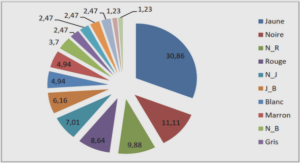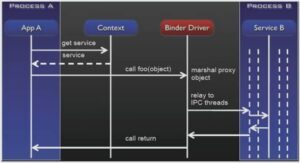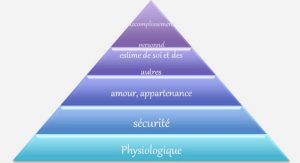Gender Conflicts in Alice Walker’s The Color Purple and Toni Morrison’s The Bluest Eye
MEN’S VIOLENCE AGAINST WOMEN
Violence is the use of physical or psychological force to constrain, dominate, and cause someone damages or death. It involves strikes, wound, or suffering.12 According to World Health Organization, it is an intentional use of physical strength, treats against others, yourself, a group or a community which leads to a high risk of traumatism, psychological damages, and problems of development, or death. 13To make the correlation with our subject in The Color Purple, communities that Alice Walker depicts are patriarchal. Men are privileged for almost everything unlike women. We notice in general that men actions towards woman are interpretable to a kind of domination. And from the established rules, whatever their acts might be, it is done in all legitimacy. That is why they allow themselves many prejudicial actions against women without thinking of any eventual impact. In The Bluest Eye, the same prejudices are caused to women by men who are not necessarily in position of power, but act under the influence of the: ―disfavored political climate describing a great upheaval in the lives of black people‖ 14 to summarize the author. Ada Azaamaka Azodo reports about the context in New Forms in Mariama Ba‘s Une Si Longue Lettre to more orient us about a possible reason of causing gender prejudices: Self and social are one and the same; one does not precede the other. And there lies the possibility of gender trouble. Gendering has to be done over and over, almost ritualistically to reproduce differently gendered people. So oneself differently gendered with deliberation, one might create.15 That implies that acting like a man or a woman is established from social construction, whose attributes are progressively acquired by training and education, which has to be changed to avoid gender conflicts. Men‘s domination over women is manifested in various forms of violence among which we note the economic, psychological, sexual or physical form. Each of these listed forms has its own consequences that can affect much the person who becomes victim of. However we focus on the two last forms in their various aspects in terms of rape as a form of physical violence and other types of physical violence in both novels under study that we develop later. 12 https://fr.wikipedia.org/wiki/violence#cite_note2 13 https://fr.wikipedia.org/wiki/violence#mw-head 14Toni, Morrison, The Bluest Eye, New York, Plume, 1994. P. 212 15 Sandra Spleth, Dixon, Cultural Dynamics of Globalization of African Literature, London, Africa World Press, 2007. P. 212 8 1. Rape as a type of physical violence Although rape actions are intended against the human body which make it part of physical violence, we specifically chose to talk about it apart to highlight its practice recurrence in The Color Purple by Alice Walker and The Bluest Eye by Toni Morrison. ―Rape action is to force sexual intercourse or other sexual activity upon another person without their consent.” 16 The passages which address the issue of rape in Color Purple, inform us that men hardly have self-control when facing women body, being their wives, daughters, sisters-in law or nieces. For their wives, even if they are not raped, they are sexually harassed as well as other female characters, which are recognized by human rights defenders as an abuse. Their men partners think that it is part of their marital duties fulfillment that they have to be submissive all the time they desire it. Contrary to their daughters and nieces, they are raped, as the cases of Celie and Mary Agnes. Celie‘s mother is married to Alphonso after her husband‘s death. In Celie‘s report she becomes weak and exhausted from overbearing pregnancies and taking care of numerous children. So she hardly finds herself in physical state to hold any intercourses with her husband. As long as Alphonso gives the impression that he cannot stay long without a woman, he makes Celie act like her mother. That is why whenever she is ill and goes to see the doctor, Alphonso seizes the opportunity to rape her in the following situation she describes that: He never had a kine word to say to me. Just say You gonna do what your mammy wouldn‘t. First he put his thing up gainst my hip and sort of wiggle it around. Then he grab hold my tittis. Then he push his thing inside my pussy. When that hurt, I cry. He start to choke me, saying You better shut up and git used to it. 17 Celie thinks that her step-father is not kind with her. Her confession to God shows that she is physically and mentally affected physically by the act. Alphonso rather asks her to get used to. As long as girls may work to sustain their mothers in household, he may imply the same practice in this context. Ordering her to get used to may be the enunciator of an oncoming similar situation as proved by the following statement reported by her: 16 Leah, Berkowitz; et al, Dictionary of American English, New York, Longman, 1983. P. 3 17 Alice, Walker, The Color Purple, New York, Washington Square Press Books, 1982. P. 11 9 The girls had a little separate room…Nobody ever come in there but mama. But one time when mama not at home, he come. Told me he want me to trim his hair. While I comb his hair, he look at me funny. He a little nervous too, but I don‘t know why, till he grab hold of me, and Crum me up tween his legs. It hurt me, you know, I say. I was just going on fourteen I never even thought bout men having nothing down there so big. How the blood drip down my leg and mess up my stocking. How he don‘t never look at me straight after that. 18 Alphonso only realizes that he did something when he sees the blood dripping from Celie; and becomes embarrassed. The blood in this situation is the evidence of the teenager‘s virgin state that has not experienced sex yet. This is also the proof that his act, as an adult behavior, is deliberate and calculated for the reason that he does it at the mother‘s absence. She is a teenager of fourteen years old, who, according to scientists, does not reach yet the maturity of spirit to come to an idea of consent or rejection in such a situation, which make it a rape. Therefore it appears not to be morally acceptable, physically thinkable or in terms of respect of her woman‘s rights to live safe of any sexual violence. But it appears with Alphonso that the desire is stronger than the logic. Raping a teenager with a tight vagina is traumatic in many ways and violates her woman‘s right to live safe from any sexual violence, as well as her human right to be spared from any psychological torture, from the humiliation of the incest. 19 Celie does not only sexually serve Alphonso‘s lust like her mother, but also keeps fulfilling the gap left by her step-mother whenever sick. In Celie‘s narration, from the way Alphonso looks like, it gives the impression that he is ashamed of his act when he sees the blood dripping from Celie. But later, she reports a similar situation. Celie is used by Alphonso whenever her mother or step-mother is ill, as if she is one of them. This behavior towards her may be understood by the fact that she is a girl who may be firstly seen from her feminine body for what it may serve for for men like him, and also from their governor govern relationship for the reason of being father and daughter. Being so, Celie finds it difficult to escape for fear of the coercion warnings she may face follows to her refusal: 18Alice Walker, op. cit., P. 108 19 Article 1, UN Declaration on the Elimination of Violence against Women, UN Doc A/RES/48/104, 20 December 1993. http://www2.ohchr.org/english/issues/women/docs/Paper_Prosecution_of_Sexual_Violence.pdf last Update: 21 April 2010; and Catharine MacKinnon ―A comment on Akayesu‖ in ―Are women human?‖ Cambridge, Massachusetts, Harvard University Press, 2006, p. 237-246. Viewed: August, 10th 2017. 10 I ast him to take me instead of Nettie while our new mammy sick. But he just ast me what I am talking bout. I tell him I can fix myself up for him. I duck into my room and come out wearing horsehair, feathers, and a pair of our new mammy high heel shoes. He beat me for dressing trampy but he do it to me anyway.20 In this report, Celie seems to be in a situation of constraint because she wants to save Nettie from Alphonso‗s temptation towards her. This may be related to a case of sexual abuse, considering the description of the rape condition. Celie offers herself as alternative to protect her sister from what she thinks may cause her destruction, although she may be affected. That implies that she knows what she is undergoing with her step-father. The same commitment is described by Harriet Jacobs in Incident in the Life of a Slave Girl through the main character, Linda, who holds on in her difficult imprisonment situation for her children, as to say that being a woman would mean to wake sacrifices for others: ―My friend feared I should become a cripple for life; and I was so weary of my long imprisonment that, had it not been for the hope of serving my children, I should have been thankful to die; but for their sakes, I was willing to bear on”.21 Mary Agnes goes through the same rape situation trying to help her boyfriend Harpo‘s wife Sofia imprisoned by the mayor. She is sent to the warden of prison by affinity, because they are both colored people, and she uses to meet him in her house of childhood. But he rather rapes her instead of recognizing this link or helping her to liberate Sofia. He argues that this act is a little fornication everybody is guilty of. By everybody, he may imply that the practice is recurrent with men like him and Alphonso in their community. She goes to discuss about a matter being a woman, but it seems that she is not taken in serious. On the contrary she is rather diverted for something else related to her gender. That insinuates that women‘s body through her, only serves to sex object for men like him. Mary Agnes impacts the rape in her flesh and mind, bothered to talk about, until they succeed to persuade her so as sign of bravery. She reports in these words: And one time bout ten years ago, when I was a little girl, you gave me a quarter… I don‘t remember that. You come by the house with my mama friend, Mr. Jimmy… He took my hat off. Told me to undo my dress … He 20 Alice, Walker, op. cit., p. 17 21 Harriet, Jacobs, Incident in the Life of a Slave Girl, Boston, Harvard University Press, 1987. P. 127 11 says if he was my uncle, he wouldn‘t do it to me. That be a sin. But this just a little fornication. Everybody guilty of that.22 Mary Agnes is rather seen as a sex object through her female body than a negotiator. She becomes victim of rape from the denial of that prerogative as prejudices of her gender and race supremacy with all the related stereotypes. In The Bluest Eye, the issue of rape is addressed by Toni Morrison in different circumstances caused by Cholly Breedlove on Darlene and his daughter Pecola. Cholly is fourteen years old and has just lost his Aunt who can reprimand him because she is the only person in charge of his education when his parents abandon him at birth. The night of his Aunt Jimmy‘s funeral banquet, Cholly invites out Darlene, a young girl from the place of the ceremony, for a walk. After a few kisses, they abandon themselves in each other‘s arms. While in full action, two white men with guns, lamp, and flashlight come to the same place and find them in full action. Darlene cries out by surprise. She is afraid and humiliated. Cholly jumps up, but the white man with flashlight who is pointing them the light, urges him to carry on the act. He gives the impression that he does not want to in his slow moving, but with the gun and light pointed on them, he is threatened. Paralyzed for fear from hearing the clop of the metal, he drops back to his knees weeping, and begins to execute the white man‘s order, who is shouting on him in the following way: ―Get on it, “nigger”, said the flashlight one. “Sir?”said Cholly, trying to find a button hole. I said, get on wid it. An‟ make it good, nigger, make it good”…“Come on, coon. Faster. You ain‟t doing nothing for her”…Cholly moving faster, look at Darlene.”23
Other types of Physical Violence
Physical violence is a great force in action, intended against the human‘s body in order to hurt, harm or even cause the person‗s death.25 In The Color Purple, it is the body confrontation between a man and a woman in a situation where one tries to have the upper position over the other. Being so, we observe the practice between Celie and her step-father Alphonso, Celie and her husband Mr.———- or Albert, Celie and the young boy Harpo, Sofia and her husband Harpo, Sofia and the mayor‘s son of six years, Annie Julia and her former boyfriend, Sofia and the mayor, Sofia and the police men. In Celie‘s relation with her step-father we learn from her that she is beaten in different situations among which we mention the following cases. From a general practice a father usually protects and corrects his daughter in case of need. That may be the reason why Alphonso beats Celie in the following situation. Celie reports: ―He beat me today cause I winked at a boy in church”26. Winking at someone may be a sign of appreciation or the contrary for something done, depending on the circumstances that we think only the author of the gesture can determine. But it appears that Alphonso is trying to put himself at her place to guess the reason why she winks at the boy for him to beat her consequently. By this restriction of gesture, he probably wants to take possession of her mind and think for her, to even control her smallest actions. Intending so, he is acting in the same way like God the Almighty, who, we suppose, only has that attribute. There is a similar case where Alphonso beats Celie for being dressed trampy. In the previous case, he beats her for a gesture, and this time, for her appearance, in Celie‘s description of the context. He, thus, extends his power of control over her, from gesture to appearance. Then, we wonder what may be the subjective reasons for the beating, and her idea of dressing trampy, beyond what she reports. Celie teaches us that it is because she has nothing to wear, despite her submissive condition. She uses to compensate the void left by her mother with Alphonso while ill, and thinks that she can do the same in her step-mother case too. She is getting ready for him not to take Nettie for the purpose. Celie comes out 25Leah, Berkowitz; et al, op. cit., p. 747 26 Alice, Walker, op. cit., P. 15 14 wearing horsehair, weathers, and a pair of their step-mother‘s high heel shoes, and he beats her for being dressed trampy. It appears as a plot for Celie against him so that he can realize the difference, because she cannot be her step-mother by wearing her stuff. On his sides, the beating may be a reminder for Celie to bears in mind from now on that she does not have to argue against his will. From what we can understand of being dressed trampy, it may be relative to the way of clothing of highway girls. From her clothing style she probably also wants to catch Alphonso‘s attention about the difference between these categories of woman and her, to stop having recourse to her like one of them. These are two contradictory situations that are difficult for both persons to understand. Therefore, on the basis of the relation that binds them, we suppose that another subjective reason is hard to be held to justify the action of beating unless on the behalf of obedience duty between a father and daughter in their situation. Alphonso finally gets bored having always recourse to Celie when his wife is not available for intimacy. He finds an argument to get rid of her by arranging her marriage with Albert. This union aims to take care of his four children, whose mother died after being shot by her boyfriend. Albert asserts it in the following words: ―well, you know, my poor little ones could use a mother‖ 27 . He intends to say by this statement that any woman, even Celie, he does not love, can serve his children as mother. However Harpo, the eldest son, in his behavior, does not seem to share the same idea with his father, for the reason that he still impacts the trauma of his mother‘s murdering circumstance. Consequently, he becomes the first person to damage Celie on her head with a rock the first day of her arrival in the family. Celie expects on protection and support from her husband who finally says nothing that can let his son realized that he does something wrong. Celie finds herself in a situation of frustration and humiliation with his silence. She is hurt in her pride of spouse in such a condition. By his silence he also gives the impression that he has less esteem and compassion toward her related to the condition in which he gets her. This feeling does not probably encourage him to take her defense. Moreover, Harpo being even just a boy may have more privilege upon women in their community, particularly, those in the same condition like Celie. The following statement seconds the above mentioned ideas: I spent my wedding day running from the oldest boy. He twelve. His mama died in his arms and he don‘t want to hear nothing bout no new one. He pick 27Alice, Walker, op. cit., p. 17 15 up a rock and laid my head open. The blood run all down between my breasts. His daddy say don‘t do that! But that‘s all he say.28 Celie does not understand his silence that is why she argues in that way; reporting to God she finds a mean of alleviation. She is not understood to deserve the treatment she needs to feel well in her mind. Being a man or a husband, gives the privilege to Harpo and Albert to act against Celie, a woman‘s will, which is demonstrated in her expressions. Albert could hardly take his wife‘s defense over his son in the previous situation if he thinks that a husband has to dominate a wife by beating her as a mean. With this state of mind, it becomes a duty for him as the husband, to stay up to that. That is why for a reason or another, he beats Celie. This idea is supported by the following statement about his advice to his son Harpo: “Well how can you spect to make her mind? Wives is like children. You have to let‟em know who got the upper hand. Nothing can do that better than a good sound beating”.29 Celie realizes that she is even more beaten than his children finally. Therefore, his act may appear as a selfish behavior about what Celie may have as resentment in this recurrent violence against her, although she is beaten with a belt with an iron buckle that may damage her body. In her inner struggle, she revives her situation in her confession to God as follows: He beat me like he beat the children. Cept he don‘t never hardly beat them. He say, Celie, git the belt. The children being outside the room peeking through the cracks. It all I can do not cry. I make myself wood. I say to myself, celie You are a tree. That‘s how come trees fear man. 30 Celie is beaten to the point she confounds herself to a tree, not to feel the pain. She undergoes the action without opposition, agreeing to bring the whisk and wait for being beaten. So, both Albert and Celie remain faithful to the cultural practice in their social role in wedlock. None of them tries to find an alternative to that, because they are conditioned to it from generation to generation. This total submission makes her ignore herself. Therefore, we can say that she does not exist, because she has no self-defense. If you do not defend yourself, and find that the others also do not do so for you, when facing a ferocious animal or war, you may disappear by being killed or devoured.
DEDICATION |






